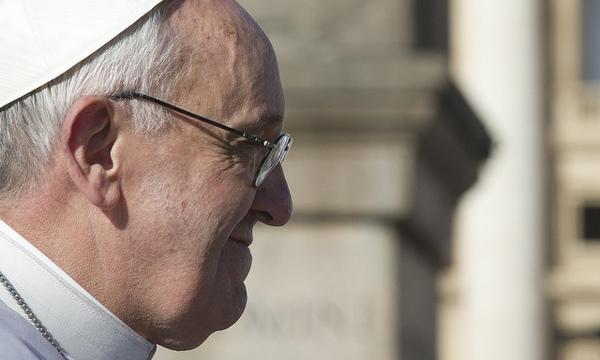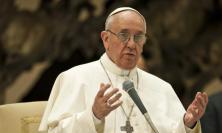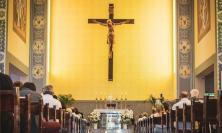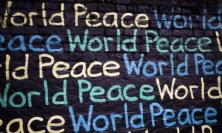Pope Francis is currently in Sweden, where he took part in the commemoration of the 500th anniversary of the Lutheran Reformation in the city of Lund. Ulf Jonsson SJ describes the religious climate in which only the second papal visit to Sweden is taking place.
The news of Pope Francis’s participation in the commemoration of the 500th anniversary of the Lutheran Reformation aroused great attention in the Swedish media when it was announced earlier this year. Only once before has a pope visited Sweden – John Paul II in June 1989 – and the reactions to the news of Francis’s visit were on the whole very positive, even enthusiastic, among the Christian churches and in the secular media. Hopes for a new ecumenical spring between Lutherans and Catholics could be heard, in Sweden and internationally. In some of the media, speculation about other possible reasons for the visit were put forward, for instance that it should be interpreted as the pope’s commendation of Sweden’s refugee and migration policies. In any case, a series of different visions about the good fruit that the visit might bear were quickly expressed.
But what are the roots from which any such fruit might grow? I want to try to draw a picture of the religious landscape in Sweden and give an account of the historical and current religious situation in the country, with a special focus on Lutheran-Catholic relations.
Sweden’s Christian history
Although Sweden is one of the world’s most secularised countries – on an average weekend about 5.5 per cent of the population attend some form of religious service – the country has a long Christian tradition. The first clear traces of a Christian mission go back to the beginning of the 9th century and 700 years of Christianisation followed. Almost 70 monasteries and convents had been established by the time Sweden emerged as a coherent nation state in the early 16th century. But thereafter, Sweden was transformed into a Lutheran nation state under one king, Gustav Vasa, who realised that a Lutheran Reformation would give him control over the church and in particular give him access to the church’s property and income. Resistance was quite strong in many places, and the Reformation process swung back and forth for many decades. It was finally under Duke Karl, who later became King Karl IX, that the decision regarding the definitive realisation of the Lutheran Reformation was carried through at the national synod of Uppsala in 1593. Two years later, the country’s last Catholic stronghold, the Abbey in Vadstena (founded by St Bridget in the 14th century), was closed.
From the beginning of the 17th century, Sweden was a homogeneous Lutheran country, and all its citizens were obliged to be Lutherans. However, when nascent industrialisation created the need for foreign labour and expertise, small groups of Jews, Catholics and Calvinists were recruited to Sweden, and they were given the right to practice their religion privately from 1781. Groups of Baptists from England and the USA started pursuing missionary work in the country in the mid-19th century, and after much strong resistance from the state church, a limited form of religious freedom was also introduced for Swedish citizens during the 1870s. Limitations were gradually lifted thereafter, culminating in the separation of church and state in 2000.
A Post-Christian secular society
Professor David Thurfjell, in his book Det gudlösa folket (The Godless People, Molin & Sorgenfrei, 2015), describes the religious landscape of Sweden today as ‘post-Christian secular’. He means that religious faith does not shape culture or society to any significant degree, that religion is seen as a private matter, and that Christianity is perceived as something belonging to the past rather than the present. Evidence of the long history of Christianity is still noticeable, especially in the form of thousands of churches spread throughout the country, but most of them are attended by very few people. Knowledge of the Christian faith is generally rudimentary, especially among younger people: in schools, confessional Christian catechesis is prohibited. And, particularly among older people, it is often considered inappropriate and embarrassing to speak openly about religion, in the same way that it might be considered improper to speak openly about sex. Many people perceive religion in the first place as the cause of violence and conflict around the world, and are therefore – as an editorial in a large daily paper expressed it – thankful that religion has a very low profile in Sweden.
Religious practice in Sweden is undoubtedly informed by a characteristic of Swedish life that has been the subject of many sociological studies: Swedes have an extremely high appreciation of individual personal autonomy. For example, family ties are weak, divorce rates are high and the majority of people live alone. Trust in the state, which is often seen as the primary guarantor of individual freedom, is high. This strong tendency to individualism applies to religious behaviour, too. The person seeking God prefers to do it in solitude, rather than with others. It is therefore not strange that religion for the most part is perceived as a purely inner and private matter. A kind of mysticism of nature – often characterised by melancholy and sentimentality – is experienced by many as the most authentic form of religion.
At the same time, it is impossible to escape the fact that several central values in Swedish society have their roots in the Christian tradition, for instance the passion for social justice and human dignity that still characterise a large part of public discourse. And many people do still make the connection between religious belief and morality, but not necessarily in a positive way. Older people in particular can be heard to talk about ‘having Luther on one’s shoulder’. Being religious in Sweden has been synonymous with leading an earnestly moral life, without joy and inner freedom.
This association of religion with a strict moral code is just one of the factors that has contributed to undermining the relationship of the Swedish people to Christianity. Another decisive factor is that the church was for a long time a state church. As a result of the Reformation, the governmental and the ecclesial spheres were merged, and the church was in all respects subordinated to the power of the state. That people were forced to Lutheran religious practice by law did not help the church’s standing among the population. And the church’s long opposition to religious freedom strengthened the impression that Christianity is identified with coercion and oppression. These factors go some way to explaining why Sweden is now a considered to be a post-Christian secular state.
However, there are signs of a renewal of interest in Christianity. For instance, there is increasing coverage of religious affairs on the national state radio and in the daily papers, and, for the most part, it is favourable. While religion is often associated with conflicts and violence around the world, there are also plenty of accounts, even in the secular media, of the positive influence of religion. Younger people are often ignorant about religious faith, but on the other hand, they are not embarrassed to talk about it and do not associate religion with coercion and oppression, as their elders might. And it is the under-30s who have the greatest interest in religious questions.
Growing interest has not, however, meant increased church attendance. On the contrary, the number of worshippers at religious services is decreasing, albeit slowly. Of the 500,000 people that attend a religious service on an average weekend in Sweden, 220,000 go to a Lutheran church. The remaining 280,000 are spread among the Evangelical denominations (primarily consisting of Pentecostals and Baptists) and denominations whose members mainly have immigrant backgrounds. Catholic and Orthodox Christians have migrated to Sweden in considerable numbers for more than 50 years, while the immigration of Muslims has taken place mainly during the last 20 years and is increasing, which will probably fundamentally change the religious landscape in the long run, even more so than the increased internationalisation of Swedish society already has.
The Lutheran church today
The separation of the Lutheran church from the state in the year 2000 constituted a radical caesura in the history of Christianity in Sweden. This reform implied a great and particular challenge to the Lutheran church because now, for the first time in history, she has to manage on her own, independent of the state. Step by step, she has developed new forms of organisation. The church is nowadays governed by a general synod elected by its own members, but it is still influenced greatly by party politics, and many are unhappy at what they consider to be a weakened role for the bishops in this structure.
The Lutheran church in Sweden is still in a phase of seeking a new identity, both on the theological level and in terms of its place in Swedish society. It is in pursuit of an understanding of what it means to be a Lutheran church in a post-Christian secular society. One of the strongest aspects of its presence is its pastoral care in hospitals and prisons, and its promotion of the rights of migrants.
The Catholic Church today
Over 80 per cent of Sweden’s Catholics have an immigrant background. Around 80 languages are spoken among the 25-30,000 Catholics who attend Sunday Mass, including Arabic, Eritrean, Croatian, Polish, Slovenian, Spanish, Ukrainian and Vietnamese. The number of Catholics has grown considerably during the wave of migration in recent years from the Middle East, in particular from Iraq and Syria. One can say that the Catholic Church in Sweden consists of two main groups: people who were born in the country and have converted to the Catholic Church as adults, and Catholics with an immigrant background; there are only a handful of families in the country who have been Catholics for more than three generations.
Up until about 50 years ago, there was widespread scepticism about everything Catholic in Sweden, and when the number of Catholics started to increase in the middle of the 20th century, there was often talk that one had to be on one’s guard against ‘the Catholic threat’. Right up to the 1980s, the European Economic Community (EEC) was seen by many as an example of a Catholic project that threatened to undermine Swedish Lutheran culture. Today, such attitudes are very rare. On the contrary, the Catholic Church nowadays arouses a lot of interest, especially because of its international nature, its long history and its spiritual and intellectual treasures. Ignatian and Carmelite spirituality in particular generate a strikingly large amount of interest among many people who are searching for spiritual inspiration, even far outside Catholic circles. Spreading the gospel among non-believing Swedes has up until now played a very subordinate role for the Catholic Church – for the most part, individual Catholics have been busy keeping their own flame of faith burning in an often unsympathetic environment – but this, too, is changing.
A particular phenomenon in the context of the increasingly positive perception of the Catholic Church is the way in which Pope Francis is presented in the Swedish media, where popes have generally been presented in a negative light. Pope Francis is an exception. Soon after his election to the papacy, journalists started describing him as a progressive reformer with empathy for the poor and vulnerable. And so it has remained. When the encyclical Laudato si’ was published in June 2015, the country’s largest daily newspaper Dagens Nyheter declared that the pope had published the most important book of the year, and an editorial in Svenska Dagbladet, another daily newspaper, described the pope as a figure of hope for humanity in our time.
The current ecumenical situation
Just as in other parts of the world, ecumenical relations between Catholics and Lutherans in Sweden progressed step-by-step during the 20th century. Besides the obvious significance of the Second Vatican Council’s decree Unitatis redintegratio and the Joint Lutheran-Catholic Declaration on Justification in 1999, Sverige kristna råd (The Swedish Christian Council, SKR, founded in 1992) has become of great significance for the ecumenical relations between Lutherans and Catholics in Sweden. SKR is an ecumenical organisation of which practically all Christian denominations in the country are members, including the Swedish Church and the Catholic Church. Through the cooperation within SKR, the Christian denominations have become much closer to each other, many different common projects have been carried through on a practical level and common theological reflection has been pursued.
The ecumenical relations between the Swedish Church and the Catholic Church peaked with Pope John Paul II’s visit to the Nordic countries in June 1989. The visit had been preceded by local bilateral theological talks between the churches in a constructive spirit, and several leading figures within the Swedish Church, including the Archbishop of Uppsala of that time, Bertil Werkström, nourished the hope of a visible unity between the two churches within a foreseeable future. The way forward since then, however, has proven to be more difficult. During the last 25 years, ecumenical relations between Catholics and Lutherans in Sweden, as well as in many other parts of the world, are characterised by a certain feeling of lethargy and stagnation. Relations are not bad – Catholics and Lutherans have got to know one another, and there are well-functioning forms of ecumenical collaboration at parish level in particular – but we lack a great ecumenical vision. Among other things, there have been several new conflicts and sources of irritation in ecumenical relations. For instance, the Swedish Church sanctioned same-sex marriage in 2009, under strong pressure from the representatives of the political parties in the general synod, despite the fact that the year before the members of SKR had agreed to try to stop the government’s proposal to alter the juridical notion of marriage in this way.
In the light of these tensions, it is an even greater joy to note that the Lutheran Archbishop of Uppsala, Antje Jackelén, has recently sent out clear signals that she wants to work towards a new phase of ecumenical collaboration between Catholics and Lutherans. She has called the Reformation commemoration events an opportunity for ‘a healing of memories, an ecumenism of love and coming together, of listening to one another and of friendship.’
The pope among Lutherans and Catholics in Sweden
It seems that there will not be any papal visit to Germany, the homeland of Martin Luther, in 1517, the year of the commemoration of the Reformation. Given that, the meeting in Lund will perhaps gain extra significance. In that case, it is even more important that this ecumenical gathering is celebrated as a signpost towards a common future, a clear witness that the gospel is a life-giving and healing power in our time, and a sign of the hope that we Christians carry within us.
Ulf Jonsson SJ is the Editor of Signum.
This is an edited version of an article that has been published by Stimmen der Zeit, La Civiltá Cattolica, Etudes and Choisir.






